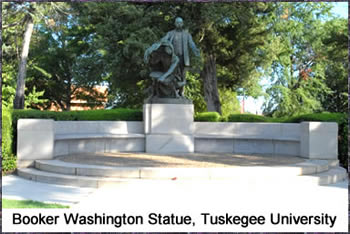
"No race can prosper till it learns that there is as much dignity in tilling a field as in writing a poem."
—Booker Taliaferro Washington
Atlanta Compromise, 1895
The period immediately following the Civil War was a time of enormous change, not only in the South but in the cities, on the Great Plains and in America's factories and other workplaces. Standards of living rose and fell at the same time—for many it was the best of times, for millions of others, an ongoing nightmare.
This section is about the former slave population in the South, the Freedmen and Women who, after 200 years of bondage, suddenly found themselves free.African Americans celebrated the end of slavery, but were soon disillusioned as they discovered that there is much nore to freedom than the absence of slavery. For them, and for whites as well, Reconstruction was a frustrating experience, yet it contained the distant promise of future reform in the area of civil rights. Much of the population and the political leadership seemed either incapable of grasping what was going on or powerless to do anything about it.
Readings
- The Legacy of the Civil War
- Reconstruction
- Lincoln's View of Reconstruction
- Radical Reconstruction: The Reconstruction Acts
- White Counterrevolution: The Ku Klux Klan
- President Johnson's Impeachment
- The Grant Years
- Reconstruction Ends 1877
- The Clock is Turned Back: Redeemers in Power
- Booker T. Washington & W.E.B. DuBois
- The Supreme Court & Reconstruction
- Chronology of Reconstruction
Documents
- Abraham Lincoln Second Inaugural Address
- Andrew Johnson's Reconstruction Proclamation
- The “Civil War Amendments” to the Constitution
- Frederick Douglass on Reconstruction
- Southern Black Codes 1865
- Terrorism in the South: Albion Tourgee on the KKK
- Booker T. Washington's Atlanta Compromise
- W. E. B. Du Bois on Booker T. Washington
- Justice Harlan's Dissent in Plessy v. Ferguson

Resources
- A Letter from a Slave to His Former Master
- American Slave Narratives at the University of Virginia
- Up From Slavery by Booker T. Washington
- Force Acts of 1870 and 1871 (Excerpts)
- Texas v. White
- Plessy v. Ferguson(Excerpt) (For the full text of Plessy v. Ferguson, go to the Cornell University Law Center and see "Supreme Court--historic decisions."
- Reconstruction Era Sources
- African American Site
- Freedmen's Bureau Online
| Sage History Home | Reconstruction | Gilded Age | Progressive | World Power |
| Resources Home | Twenties/New Deal | World War 2 | Cold War | Post-WW2 Domestic |